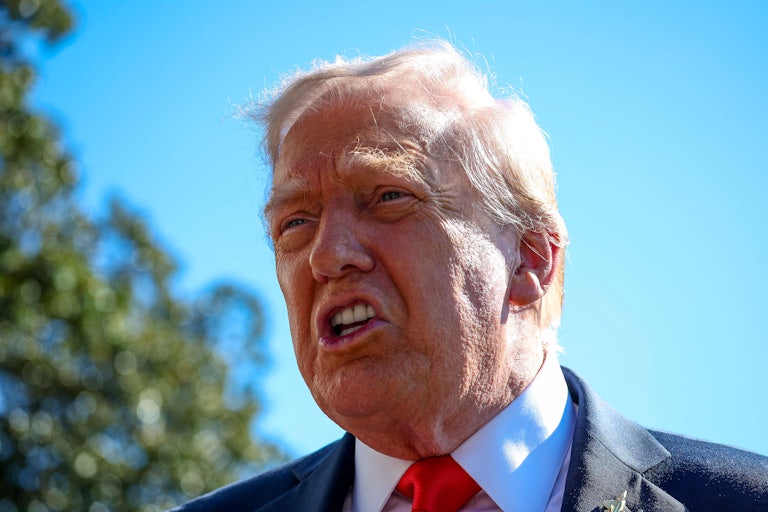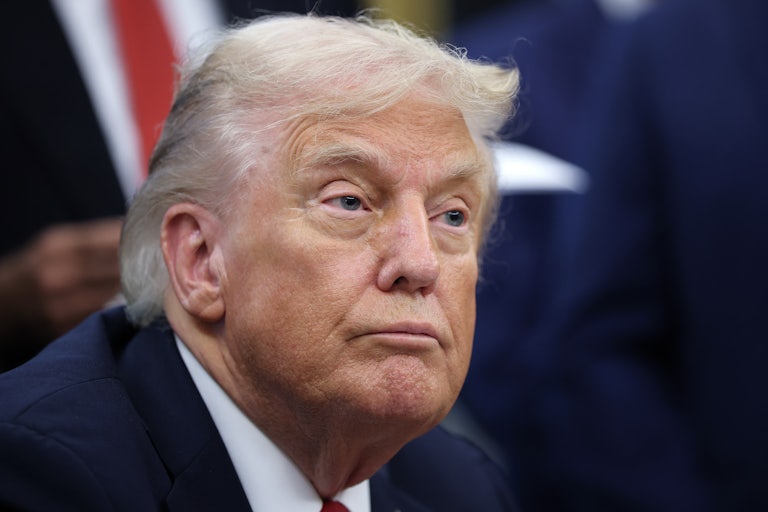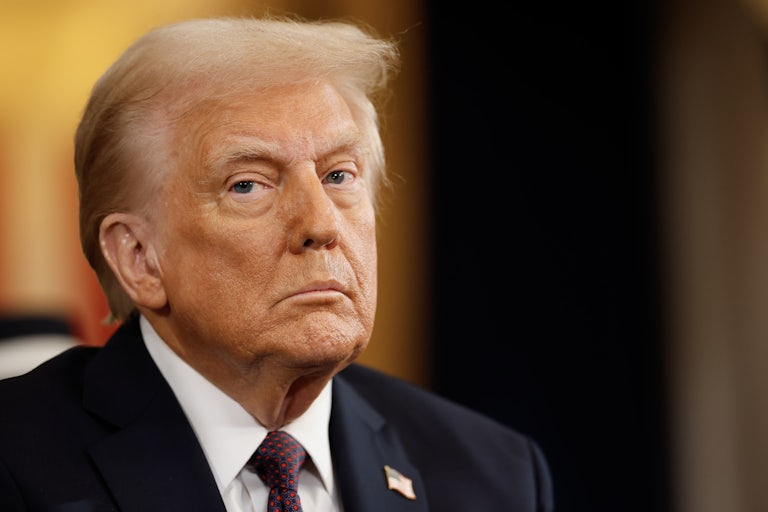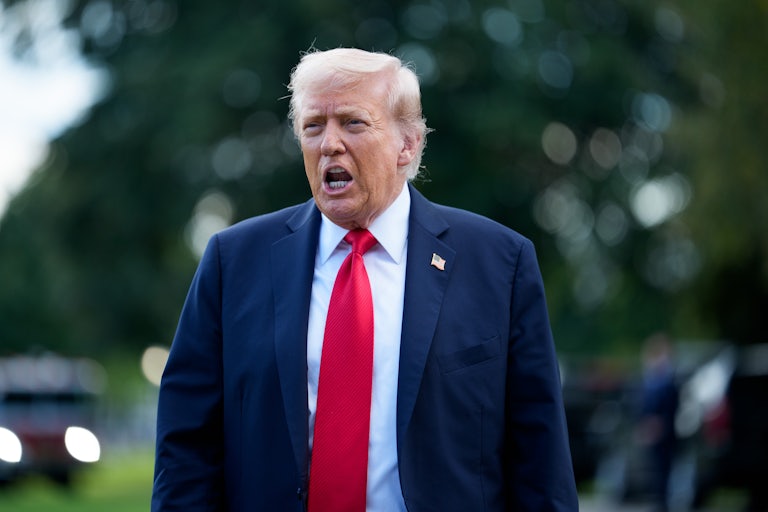President Wants Legislators Hanged, and It’s Not Even the Lead Story
Donald Trump says he’d like to see lawmakers tried and executed, and The New York Times and The Washington Post just don’t seem to think it’s that big a deal. Why?
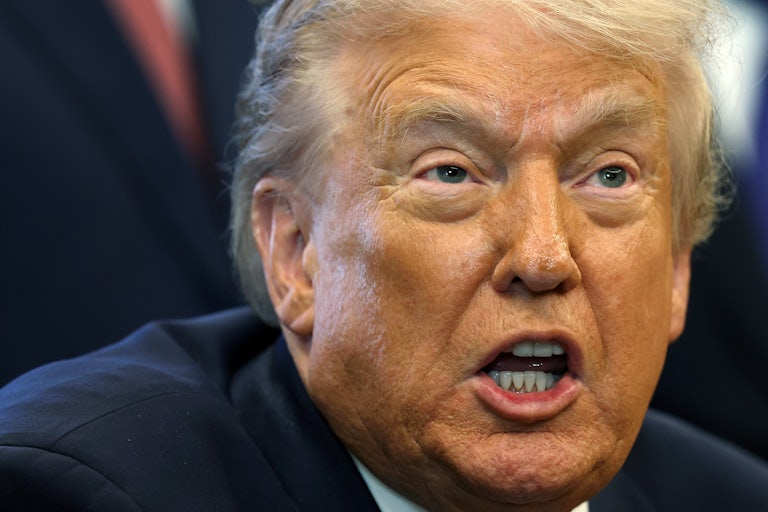
I’m sitting here early Friday morning with the home pages of The New York Times and The Washington Post up on my screen. The president of the United States, as you know by now, has accused six Democratic legislators of sedition, or, as Donald Trump inevitably puts such things, “SEDITIOUS BEHAVIOR AT THE HIGHEST LEVEL,” adding that it is “punishable by DEATH!” He also re-Truthed a comment reading “HANG THEM GEORGE WASHINGTON WOULD !!”
Trump says a lot of outrageous things, and we know why he says them. First, he’s an unhinged sociopath who knows nothing about American history (George Washington is literally the last person who’d behave as above, more on which later). Second, when he is attacked, as he was here—or as he believes he was; the sextet was actually just stating a fact of American tradition and law—he strikes back in the most juvenile way possible, since his emotional development was arrested at about age 13 (which is perhaps being generous). And third, he’s trying to distract from an otherwise bad week—arguably the worst of his second presidency, as his own party moved essentially in unanimity against him on the Epstein matter (something that, speaking of American history, I’m not sure has ever happened before).
So we know all that about him, and we’ve come to accept it. But come on. Hang them? Elected representatives of the people? Who have all served their country in the armed forces or in risky intelligence work? Not that that last point should matter one way or the other, but it does count for something. Senator Mark Kelly, for example, flew 39 combat missions during the Persian Gulf War. This was around the same time that Trump was working overtime to suppress a documentary about him that showed him to be the gangster and conman we all know him to be today.
But put these personal details to the side, and stick to the mere objective fact: A sitting president of the United States has called for the execution of six legislators. I don’t know this for certain, but it seems nearly impossible that this has happened before. I don’t think Abraham Lincoln did it, and he was dealing with actual traitors. Maybe, you know, Franklin Pierce or James Buchanan did it on a bad day. Or Andrew Johnson. He was temperamentally capable of something like this. But that hardly makes it defensible. As they were three of the worst presidents in U.S. history, that only makes it worse.
OK. Back to the Times and the Post now. How in the world is this not the top story this morning? Indeed: How is it not the only headline above the fold, the kind of headline they usually reserve for world wars?
But it’s not. It’s not even close. On my Post home page around 7 a.m. Friday, you have to spin the scroll wheel on the mouse about seven times even to see the headline and subhed, which do not, incidentally, mention the “death” part at all. (The story did appear on the upper left of the front page of today’s physical paper.) At the Times, I had to give the scroll wheel four spins before I saw the story; the headline does quote Trump’s words “punishable by death.” But the Times didn’t even put it on the front page of their physical paper—there was only a single-sentence reference to the story in a small box titled “More on the White House,” as if this was just more ho-hum news from 1600 Pennsylvania Avenue.
When I peeked at the Times on Thursday night, I noted that the headline did not even mention the death part. It read: “In Outburst, Trump Accuses Democrats of Sedition Over Video to Military.” Sweet Jesus, Times. It’s a small thing, perhaps. But “outburst”?! It’s a telling little example of how mainstream news headline writers continue to try to use the normal conventions of objective journalism style to describe behavior that is an offense against normalcy.
The headline writers at the two papers would undoubtedly snicker at me. I’m being alarmist. Trump says a lot of things. He doesn’t really mean it. Or, even if he does mean it in the moment, it’s not really to be taken seriously. It can’t happen here.
I’m sorry. Those are all the rationalizations of people who have decided that anti-alarmism is the proper, neutral posture toward Trump. I won’t psychoanalyze them and say why, although I have my theories. I’ll just say that they—and many people like them who package mainstream news for tens of millions of readers and viewers and listeners—have shown us time after time after fatiguing time that they believe that Trump’s outrageous remarks need to be “contextualized” and that we shouldn’t get too worked up over them.
Trump said in 2016 that people at his rallies should beat up protesters. Oh, relax—maybe he was joking. He said there was a Second Amendment solution for Hillary Clinton. Well, that was ambiguous. He clearly and repulsively mocked a journalist with physical disabilities. Well, it wasn’t completely clear what he was referring to. Barack Obama was spying on him. Well, there may be no evidence, but that’s Trump being Trump. And so on, times a thousand.
Question: What will it take? Where is the line that Trump must cross for these people to say to themselves, “OK. That’s enough. We are alarmed, and we believe America should be alarmed, and we are going to cover this like it’s the crisis it is.” If calling for six legislators to be hanged doesn’t clear that bar, what will?
These legislators did nothing wrong. They said, “You can refuse illegal orders … you must refuse illegal orders.” This is correct and true. It is what recruits are taught in every branch of the military. It prevents a president from turning the military into his own personal army, and as such, it’s one of the key principles that keeps a democratic republic from careening into dictatorship.
As to why they felt moved to make this video in the first place—well, we don’t really know the answer to that yet, but you don’t have to be George Patton to know that Trump would like to use the military to do whatever he wants it to do. TNR’s Greg Sargent interviewed one of the six Democrats, Representative Chrissy Houlahan of Pennsylvania, for his Daily Blast podcast today. Here’s what she had to say:
Sargent: It sounds to me like all of you who have military or intelligence experience are hearing from inside these institutions that there’s real and actual concern, live concern, that people are being asked to carry out illegal orders. Is that what’s going on?
Houlahan: It’s partially what’s going on. It’s also sort of the buildup of the last nine or ten months, where we have watched this president kind of push on every boundary, try to break every circuit, so to speak, and overload us all with attempts to figure out where the lines are in the law. And so it’s not just in the military realm—though of course that’s what this particular podcast or broadcast is about—but it is abundantly evident with more than 149 instances over the last months of the president putting out orders of one form or another that have then been pushed to the courts in some way, shape, or form.
Houlahan went on to tell Sargent that she had “had a few conversations with people who have indicated discomfort with sort of the current state of affairs” and that “I know my colleagues have had similar kinds of conversations.” I would imagine we’ll be hearing more about this.
The country should be thanking these six for making this public warning, both because it described a very real threat to the Constitution and because, in eliciting a crazed response from Trump, the video showed America a new and even more depraved level of his dangerous ignorance. George Washington, please. Washington is the most anti-Trump leader not only in American history but probably in the history of the modern world.
Washington advocated a certain degree of mercy toward prisoners of war. When he captured more than 900 Hessians at Trenton in 1776, he not only didn’t hang them—he ordered that his troops do them no harm. Instead of being hauled off to prisons, they were sent to farms and allowed to work. And, of course, we all know—or I hope we all know—that Washington directly rebuffed his chance to become America’s dictator in 1783. Trump, as usual, hasn’t the slightest idea what he’s talking about.
But Trump himself is only part of the problem here. The other part is a media that collectively thinks we ought to just shrug these things off as Trump being Trump. Yes; it is Trump being Trump. And that’s precisely the problem. Does someone literally have to die before these “outbursts” merit a banner headline? Or even then, will they counsel us not to be alarmed—to consider the context? These people are going to help contextualize us into dictatorship.
This article first appeared in Fighting Words, a weekly TNR newsletter authored by editor Michael Tomasky. Sign up here.





